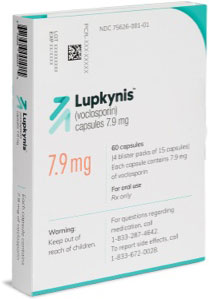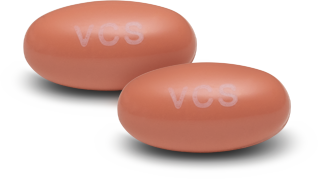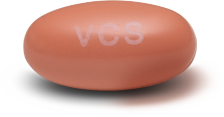Recommendations for Dosing of LUPKYNIS, Along With MMF and Low-Dose Steroids (≤2.5 mg/day)1,2,a

The recommended starting dose of LUPKYNIS is 23.7 mg, taken twice daily1

3 capsules
(7.9 mg each)
BID
12-hour
schedule
Taken as close
as possible to
schedule1
Empty
stomach
1 hour before
or 2 hours
after a meal1
Swallow
whole
Should not open,
crush, or divide
capsules1
- LUPKYNIS is indicated in combination with MMF + steroids for the treatment of adult patients with active LN1
- Dose should be taken within 4 hours. Beyond 4 hours, wait until next scheduled dose; do not double the dose1
No drug-level monitoring required.1
Individualized eGFR-Based Dose Modifications
Assess eGFR Every 2 Weeks for the First Month, Every 4 Weeks Through the First Year, and Quarterly Thereafter1
eGFR ≥60 mL/min/1.73 m2
No dose adjustment necessary;
continue 3 capsules BID

eGFR <60 mL/min/1.73 m2
≤20% reduction
from baseline

No dose adjustment necessary; continue 3 capsules BID
>20% and <30%
reduction from
baseline

Reduce dose to 2 capsules BID

Reassess eGFR within 2 weeks; if still >20% reduced from baseline: reduce dose to 1 capsule BID
Reassess eGFR within 2 weeks; if still >80% of baseline, consider increasing dose by 1 capsule BID; do not exceed starting dose
≥30% reduction
from baseline
Reassess eGFR within 2 weeks; if >80% of baseline, consider restarting at 1 capsule BID
LUPKYNIS, like other calcineurin inhibitors, can cause acute and/or chronic nephrotoxicity. Monitor eGFR regularly during treatment and consider dose reduction or discontinuation in patients with decreases in eGFR from baseline. Patients with a persistent decrease of eGFR should be evaluated for chronic calcineurin-inhibitor nephrotoxicity. Consider the risks and benefits of LUPKYNIS treatment considering the patient’s treatment response and risk of worsening nephrotoxicity. The risk for acute and/or chronic nephrotoxicity is increased when LUPKYNIS is concomitantly administered with drugs associated with nephrotoxicity.1
The phase 3 study was designed to allow for dose modifications due to eGFR reductions.1,3
Other Dosing Adjustment Recommendations
- Please refer to the Prescribing Information for a full list of dosing recommendations for specific patients, renal impairment, hepatic impairment, hypertension, and drug interactions with moderate CYP3A4 inhibitors and certain P-gp substrates with a narrow therapeutic window
- Monitor blood pressure every 2 weeks for the first month of treatment, and as clinically indicated thereafter1
- For blood pressure >165/105 mmHg, discontinue LUPKYNIS and initiate antihypertensive therapy
- Avoid co-administration with strong CYP3A4 inhibitors (eg, ketoconazole, itraconazole, and clarithromycin) and strong and moderate CYP3A4 inducers1
- Avoid eating grapefruit or drinking grapefruit juice while taking LUPKYNIS1
aLUPKYNIS is indicated in combination with MMF and steroids for the treatment of adult patients with active LN.1
BID=twice daily; eGFR=estimated glomerular filtration rate; LN=lupus nephritis; MMF=mycophenolate mofetil.
References: 1. LUPKYNIS®. Prescribing information. Aurinia Pharma U.S., Inc.; 2025. 2. Rovin BH, Teng YKO, Ginzler EM, et al. Efficacy and safety of voclosporin versus placebo for lupus nephritis (AURORA 1): a double-blind, randomised, multicentre, placebo-controlled, phase 3 trial. Lancet. 2021;397(10289):2070-2080. 3. Saxena A, Ginzler EM, Gibson K, et al. Safety and efficacy of long-term voclosporin treatment for lupus nephritis in the phase 3 AURORA 2 clinical trial. Arthritis Rheumatol. 2024;76(1):59-67.
